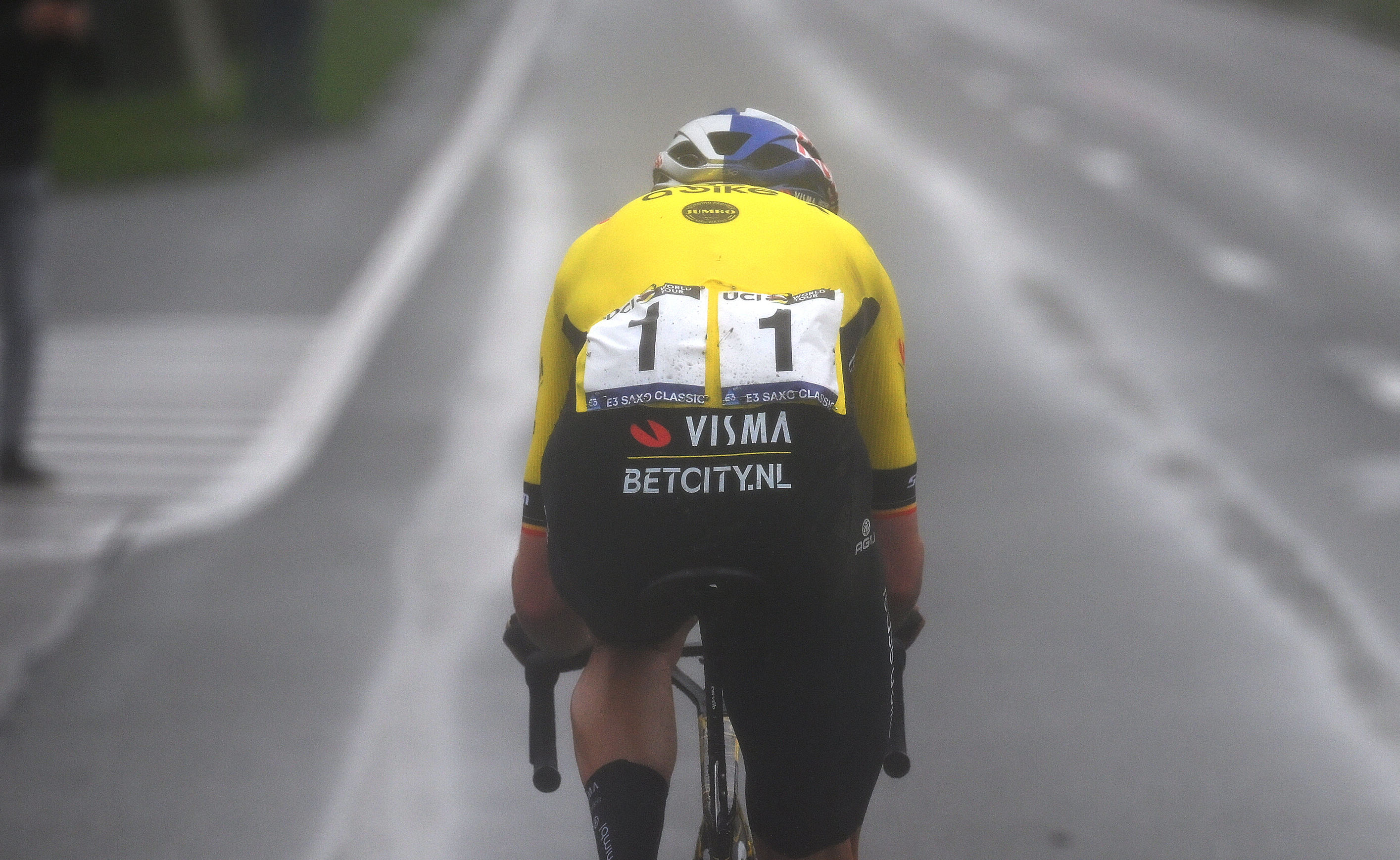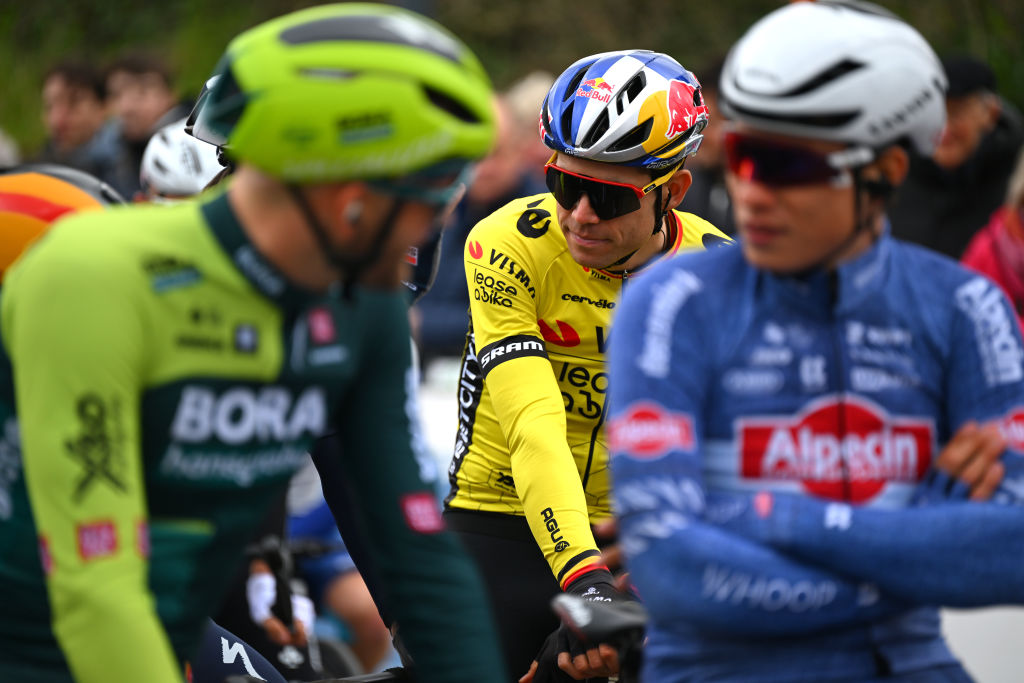
The impact of the crash left an immediate mark on Wout van Aert, his jersey torn to shreds, his back aflame with road rash and the multiple fractures causing huge pain. The magnitude of the moment took a beat or two longer to register.
When it did, Van Aert’s body began to convulse in sobs. He didn’t need an x-ray to tell him what his broken heart already knew. His 2024 Classics campaign had ended, not in victory on the Roubaix velodrome, but here, on a lonesome road outside Ronse, 67km from the finish of Dwars door Vlaanderen.
On television, Van Aert’s guttural howl could be heard even above the confused, excited babble of the commentary team, and it was hard to tell if the anguish was for the pain of his injuries or the death of a dream. It was hard, too, not to think of Sean Kelly and a similar moment of pathos at a critical moment in his career.
Comparisons with Kelly have accompanied Van Aert on some of his most sparkling outings, those afternoons when nothing seemed beyond the range of the most dextrous rider in the peloton. Perhaps it was only logical that there would be a parallel between them on Van Aert’s saddest day too.
The 1987 Tour de France was something of a last dance for Kelly as a yellow jersey contender. With Bernard Hinault retired and Greg LeMond absent, the Irishman set out from Berlin as the closest thing to a favourite for one of the most open Tours in living memory. His challenge ended not far outside Brive on stage 12, when he fractured his collarbone in a low-speed crash. He battled on for an hour before yielding to the inevitable and climbing off.
When Kas directeur sportif Christian Rumeau draped a long-sleeved jersey across Kelly’s shoulders and led him towards the team car, he could contain himself no longer. The hardest man in cycling wept openly and unashamedly, and the whole Tour caravan seemed to mourn with him.
The throbbing of a broken collarbone was something Kelly could handle, he’d experienced it all before. The pain of pulling the plug was something else, an agony beyond even his famous stoicism.
So it was for Van Aert on Wednesday.
After he dragged himself to the side of the road, he was hit by the realisation that his carefully tailored approach to the Tour of Flanders and Paris-Roubaix had been for nothing. His whole season has suddenly been derailed. He is unlikely to recover in time for the Giro d'Italia, forcing him to rethink his preparations for the Paris Olympics.
“We have never seen Wout van Aert cry after a setback. Never! This time, yes,” Het Nieuwsblad noted on Thursday morning.
“Van Aert’s tears were tears of pain and disappointment. The realisation that all the sacrifices of the past few months have been in vain hit Van Aert like a hammer blow.”
Van Aert had raced a reduced cyclocross programme over the winter as part of his Ronde mission. He had spent weeks cooped up at altitude in the Parador Hotel in Tenerife. He had skipped Strade Bianche and Milan-San Remo. For months, everything in his life had existed as a function of March 31.
And now it was gone.
A dark edge
Although Van Aert’s Visma-Lease A Bike teammate Matteo Jorgenson went on to win Dwars door Vlaanderen, it was a muted kind of celebration at the finish in Waregem.
Tiesj Benoot placed fourth on the day, but when he arrived in the mixed zone, his thoughts were for his inadvertent part in Van Aert’s crash rather than his key role in Jorgenson’s victory.
“Wout shouted at me to accelerate, which I did,” Benoot said of that mass crash on the rapid approach to the Kanarieberg. “But I think he touched my back wheel when I stood up to accelerate. I feel really shit about it, actually.”
Benoot’s part in the incident was a cruel irony. He had done more than most to prepare Van Aert for his planned prize fight with Mathieu van der Poel at the Ronde and Roubaix, joining his friend on that three-week camp in Tenerife, sparring with him on those endless rides amid the red scree of Mount Teide.
The mood was sombre at the Visma-Lease A Bike team bus, where most reporters had congregated after the race. Plans to check in with various Ronde contenders in the mixed zone were put on hold. Hold the front page: Van Aert’s status was the story that would dominate the news cycle in Flanders.
At that very moment, Van Aert was in hospital undergoing assessment, but the diagnosis already seemed self-evident. Directeur sportif Grisha Niermann tried to strike an upbeat note, even if he knew he was fighting a losing battle.
“In any case we will start on Sunday with seven strong riders,” he said, surely already aware they would be lining out without their strongest.
At various stations around the Visma-Lease A Bike bus, members of the management team were being waylaid by television crews and reporters. Nobody yet had precise information about Van Aert’s injuries, but everybody already sensed what the outcome of those x-rays would be. That howl on the roadside had said it all, long before the announcement dropped detailing Van Aert’s broken collarbone and ribs, and confirming his absence from the Ronde, Paris-Roubaix and Amstel Gold Race.
Merijn Zeeman couldn’t help but dwell on the duality of the occasion when he spoke.
“One moment, you see the terrible crash of Wout and those other boys, the next moment a rider crosses the finish line with his hands in the air,” he said. “Cycling is a beautiful sport with a dark edge.”
Doomed

Van Aert has won 46 races as a professional, including an enviable litany of Classics: Milan-San Remo, Strade Bianche, Gent-Wevelgem, E3 Saxo Classic (twice), Omloop Het Nieuwsblad and Kuurne-Brussel-Kuurne.
The races he covets above all others are the Tour of Flanders and Paris-Roubaix but his relationship with those events has been an ill-fated one.
“The Ronde and Roubaix: they are beginning to seem a bit doomed for Wout van Aert,” was how Thursday morning’s edition of Het Laatste Nieuws put it.
Van Aert’s only truly happy Ronde experience came on his debut in 2018, when he placed a promising ninth as he made his tentative transition from cyclocross to road.
A year later, he was a disappointed 14th. In 2020, he placed second in a two-up sprint, pipped at the last by his forever rival Mathieu van der Poel.
The following spring, Van Aert was a relatively subdued sixth, but that was better than 2022, when a COVID-19 diagnosis ruled him out altogether. Twelve months ago, he had to settle for fourth, unable to live with Van der Poel and Tadej Pogacar.
His track record at Paris-Roubaix has been just as frustrating. After placing 13th in 2018, a series of mechanical mishaps meant his sparkling form carried him only to 22nd a year later. He was a tired seventh in the pandemic-delayed edition of 2021, before having to settle for second the following April. Last year, a late puncture ruined Van Aert’s challenge and consigned him to third place.
And now this latest misfortune.
Van Aert will be 30 years old by the time he gets to dream it up all over again. In previous generations, that was the age when a Classics hunter might have felt he was reaching his prime. These days, the picture is less clear.
“That's young enough to win the Ronde and Roubaix,” Het Laatste Nieuws noted. “But on the other hand: in modern cycling, winners are getting younger and younger. It doesn't get any easier.”
For Van der Poel, on the other hand, the path to a record-equalling third Tour of Flanders win might just have become a little more straightforward.
On the evidence of E3 Harelbeke last Friday, Van Aert was the only rider who could hope to occupy the same rarefied spaces as the world champion on the Kwaremont and Paterberg on Sunday.
Now Van der Poel’s status as favourite is almost overwhelming, not least because Lidl-Trek have also lost Jasper Stuyven after he broke a collarbone in the same crash as Van Aert. Stuyven’s teammate Mads Pedersen, so impressive a winner at Gent-Wevelgem, also went down in the crash, though the Dane’s participation on Sunday doesn’t seem in doubt.
“Even if Mathieu van der Poel wins the Tour of Flanders on Sunday, it will forever be the edition that was largely decided four days earlier on the descent to the Kanarieberg,” said Het Nieuwsblad.
In truth, that assessment might prove something of a stretch. Cycling history is liberally punctuated with such sliding doors moments, and we forget all about them far sooner than we think.
Tom Boonen’s 2012 Tour of Flanders victory isn’t diminished by the fact Fabian Cancellara crashed out with 50km to go. There’s no asterisk in the record books alongside Peter Sagan’s 2016 Ronde win to highlight how the on-form Greg Van Avermaet was taken out by a crash either.
The cycling world shifted on its axis when Van Aert clipped Benoot’s wheel on Wednesday afternoon, but the race kept rolling on just as furiously as before. It always does.
There’ll be a race on Sunday too, and an occasion to match. The beauty and the barbarity of the Classics is that they wait for no one. Van Aert knows that better than anyone.
Get unlimited access to all of our coverage of the Spring Classics – including reporting, breaking news and analysis from the Paris-Roubaix, Tour of Flanders and more. Find out more.







